“You will die on your 16th birthday, my dear son,” Marudvathi whispered, her voice trembling, as his father, Sage Mrkandu’s, silent tears stood testimony to the pain of impending vilomah.
In an instant, his world shattered into a million pieces. He sat unmoving, shocked, as his parents narrated the story of his imminent death.
Markandeya Learns a Horrible Truth
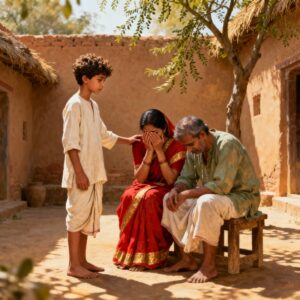
The entire conversation started one day, a month after his 15th birthday. Markandeya’s parents had suddenly turned sad. He found them crying often, many times when they thought they were alone. Whenever he asked them the reason for their sadness, they would make up excuses.
“I wasn’t crying. Something went into my eyes,” his father said a couple of times.
“My legs are aching a lot, and the pain is killing me,” his mother once said, unconvincingly. He knew better! As if physical aches could ever bring tears to his parents’ eyes. They were accustomed to hard labour.
Then, one night, a month after his 15th birthday, he opened his eyes inexplicably and sat up in shock. His parents were staring at him in his sleep, shedding copious tears. Initially startled at being discovered crying so openly, they tried to brush off their strange behaviour as a reaction to a nightmare.
But when Markandeya persisted, they finally relented as he sat them down and said, “If you don’t tell me what’s bothering you, how can I help you solve the issue?”
And that’s when his world shattered because his mother said, “You are going to die on your sixteenth birthday!” He shook himself from the deep sense of numbness that threatened to take over his mind, body, and soul and gently pried the story from his parents.
His mother said, “You already know how you were born, my dear son.”
“Yes, you have told me that story often. I am Lord Shiva’s boon to you after intense prayers and meditation on Him.”
“Indeed,” replied his mother, “when He first appeared before us and told us he was happy to grant us the boon of parenthood, both your father and I were thrilled beyond measure. Until He gave us a choice, a difficult choice-the mighty Lord of Kailash wanted us to choose between a dull-witted, evil child who would live long and a good-natured and morally upright child who would die at his sixteenth birthday.”
His father took on the narrative, “It was right here, on the outskirts of this beautiful village, that we meditated and prayed to Lord Shiva. We made this our home once He promised us to make you our child. The day you were born was the happiest day of our entire lives. We named you Markendeya, the Son of Mrkandu.”
Marudvathi stopped her husband, seeing his delaying tactics to avoid discussing the dreaded part of the story. “You cannot avoid speaking of the dreaded choice. It’s time ur son hears about it.”
His father, nodding sadly, said, “Yes. Let me revisit that difficult choice: the dull-witted, evil child with a long life or the pious child with a short life? It took me an instant to make the choice. It had to be the pious child, not the dull-witted, evil one. If it were only dull-witted, I would’ve still hesitated. But no parent wants to bring an evil child into this world. So, at that time, it was a no-brainer for us. We were beyond happy to nurture a clever, pious, loving, and hardworking child like you. The horrible consequence of our choice dawned on us like a bolt from the blue on your 15th birthday.”
Marudvathi continued, “But now, as your 16th birthday comes close, I’m second-guessing our decision. Should we have taken the evil child with a long life? We can be parents only as long as we have a child, right? And would any parent’s love for their child be less based on his or her morality? I’m not so sure of anything, anymore.”
Fresh tears filled the couple’s eyes as they struggled to make sense of their choices and consequences. Seeing his parents in such distress, Markandeya swallowed his own pain and consoled them.
Suddenly, his mind filled with a strange sense of peace, coming from unconditional acceptance, from the place of making a resolute decision. He said, his voice reeking with determination, “If the Master of Mighty Kailash can take away a life, He can also spare one from Death, right?”
The boy’s words and tone of voice worried his parents as much as giving them a sliver of hope. They were happy his thoughts went to Lord Shiva. But they worried he would do something brash. After all, young blood is powered by raging hormones. His father wiped his tears and said gently, “My dear son, what are you planning? One cannot fight destiny. Don’t do anything that’ll impact your future births, too.”
The young boy smiled at his parents and replied. “Oh! I know that, Father.”
He turned to his mother. “Don’t worry, Mother. I won’t do anything rash. You have taught me maturity and wisdom. I’m merely planning to meditate on Lord Shiva and let Him decide for me. I’m going away to the hills to find a calm place for this task. Even if I fail, I’ll die knowing I tried. I’ll die happy in the knowledge that the last days of my life were spent meditating on Him.”
His parents blessed their son and bid a tearful farewell. Markandeya walked for a couple of days and reached a dense forest. There, he found a beautiful hillock, atop which was a natural cave, providing him with the protection and privacy he needed for his ominous task.
He sat down and started meditating on Lord Shiva. As his eyes closed, the young teenager’s determination emanated like an aura, filling the environment with an ethereal glow. At nighttime, the residents of nearby villages stared in awed wonder at what looked like the rising sun.
Some of them walked to the hilltop and saw the young boy meditating in front of a Shiva Linga, with a fierceness that they hadn’t seen ever. His face was calm, like a man who has nothing to lose and has decided to do everything in his power to fight for his dreams. His body was erect, set in stone, refusing to give up until his dreams are realised or he dies trying.
Seeing the boy’s determination, the kind villagers brought him food and water every day. But it was left untouched. The boy didn’t open his eyes for anything or anyone, so deep and intense were his thoughts on the Lord of Kailash.
As his 16th birthday approached, Markandeya’s body became frail and thin. But the glow in his aura increased multifold, and his body began heating up. The grass under his legs was singed, and a few burnt insects were also found. The villagers began to worry that the heat from the lad’s body would ignite a jungle fire.
But before that could happen, the boy’s 16th birthday dawned, dark and ominous. At the prescribed time, the messengers of Lord Yama came for his life. The power of his meditation was so intense that they couldn’t get anywhere near him. Finally, the Lord of Death himself was forced to come riding on his black buffalo for the deathly task.
The earth rumbled, the black skies thundered, Mother Nature stood frozen, the sun hid behind a thick cloud covering the earth in deathly darkness, all in fear. It was one of those rare occasions when the Lord of Death made a personal visit to Earth to take someone’s life.
Markandeya was forced to open his eyes now. And before him stood Lord Yama, his red eyes and lips in stark contrast to his black face. Lethal snakes writhed around his body, rippling muscles twitching dangerously. His lips were smiling, but the smile didn’t reach his eyes. Even the strongest of men would quail in fear at the sight of this ominous form.
But Markandeya kept a fearless facade as the voice of death bellowed into his ears. “Let’s go, young man. It’s time!”
“No, No. I will not come, not before having a sight of the mighty Lord Shiva.”
“Not even Lord Shiva can save you from death.” Death’s horrific laughter singed every nerve ending of the boy, the overarching pain almost killing him. He realised the inevitability of Death’s words. Yet, he didn’t give up.
Markandeya hugged the Linga and refused to let go. Furious to see that his repeated threats failed to have an impact, Yama pulled out his death noose and tossed it. It caught Markandeya’s neck as well as the Shiva Linga that he was hugging with all his might. Yama pulled the noose tight, his reckless anger blinding him to the fact that the noose was also pulling the Linga.
Lord Shiva opened His eyes as the noose tightened around Him and his devotee. The fury of Neelakantha at the audacity of Death made His blue throat turn red. He sprang forth and manifested Himself at the Linga that the boy was hugging. Suddenly, Markandeya found himself hugging a warm body instead of cold stone, even as the death noose tightened around his neck, his breath coming in struggling spurts as the thread of life was gradually being pulled away. In seconds, he lost his hold and fell at the feet of Lord Shiva, who was looking wrathfully at the Lord of Death.
Lord Shiva’s fury reached a pure, unadulterated state, instigating His third eye to open automatically, directing itself to Death, killing him instantly.
The death noose suddenly lay limp around Markandeya’s neck as the breath of life coughed its way back into his body. When he became aware of Lord Shiva, he scrambled to his feet and fell at His feet. He smiled at one of His most ardent devotees.
“As long as you fight with this kind of faithful determination, Death can come nowhere near you, Markandeya. With this act, you have made yourself immortal. You will live until the end of this Kalpa,” Lord Shiva declared.
News of Lord Yama’s death created uproar throughout the universe. Lord Brahma and Lord Vishnu realised the imminent outcomes of the death of Death. Unrestrained immortality would end nature’s cycle of birth and death, creating terrible imbalances that the cosmos could not endure. The end of the present Kalpa would happen before its time. Shiva’s immortality boon to Markandeya would defeat its purpose.
This realisation hit the Lord of Kailash, too. Even as the gods and goddesses looked on with worry at the scene below, He, with His limitless powers, revived the God of Death. Lord Yama, upon revival, fell at Shiva’s feet and sought His blessings and returned empty-handed to the underworld, one of those rare times when the soul couldn’t be separated from the body at its destined time.
The Pandavas Listen to Sage Markandeya’s Story of Immortality
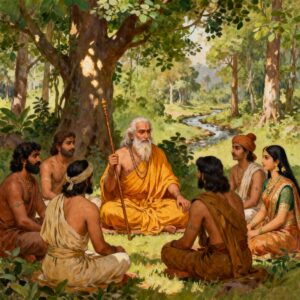
The streams stopped flowing. The stone mountains shed silent tears. The leaves stopped rustling. The air stood still. As if everything was taking in Sage Markendeya’s life story into their very being.
The Pandavas and their wife, Draupadi, sitting in the midst of wondrous nature, were rooted to the spot, speechless as they heard the immortal, wise Sage Markandeya narrate his life story. It was one of the most beautiful days in their otherwise grim 12-year exile, imposed on them by their cousins, the Kauravas, as a result of a game of dice.
Today, all their pain and suffering took a back seat as their heightened emotions manifested in copious tears streaming down their faces, with reverence and respect for the gentle sage radiating from their eyes.
After a while, Yudhisthira, the eldest, said, “Sire, your story is not just fascinating but is also filled with life lessons. It’s incredible how you conquered Death Himself!”
The sage stopped the Pandava. “No! No! I didn’t conquer Death. It was Lord Shiva who killed Lord Yama, the God of Death. That’s why He is known as Mrtyunjaya and KaalaKaala. My being immortal is a direct result of His grace and blessings. I did nothing except keep my determination and faith unwavering.”
While the discussion on the grace of Shiva continued, Draupadi, helped by Nakul and Sahadev, went inside their humble hut to cook an evening meal. The three of them brought it outside. There was a lull in the conversation as everyone partook of the simple, tasty meal.
With the evening meal done and the kitchen cleaned and closed, the Pandavas and Draupadi again sat in front of Sage Markandeya.
Sage Markandeya Shares Life Lessons
Arjuna had a question. “After being alive for aeons, how do you keep the faith in the universe and its purpose? Don’t you feel the burden of seeing evil repeated relentlessly, especially among humans, the species believed to have conquered nature and “civilised themselves”? Don’t you want to give up and pray to Shiva seeking mortality again?”
The sage smiled. “Yes, I totally understand your question. I’m quite certain you, your brothers, and Draupadi believe death is better than this life, a life of betrayal and uncertainty? A life filled with more sadness than happiness? A life separated from your other loved ones, because of the injustice meted out to you? Right?”
The brothers nodded sadly, and Draupadi looked down, tears rolling down her face as the sage expressed her innermost turmoil so vividly.
Sage Markandeya called her name gently. “My dear Krishnaa, I cannot pretend to know what goes on in a mother’s heart forced to choose between her husbands and children. I’m sure your heart bleeds to think of them, struggling through their most difficult part of their lives, adolescence and new adulthood, without their mother. Yet, I hope what I say about this world, after aeons of living in it, might bring you some solace.”
He looked in turn at each of the five brothers and said. “When I returned home with the boon of immortality, they were beyond thrilled. I lived with them for a long time, almost forgetting that I will never die. When they died, I realised the power of my immortality. I realised I’m going to see people come and go, but I will remain on earth eternally. It was a powerful truth, one that triggered a strong surge of emotions, mostly fear and uncertainty.”
He paused as memories of those difficult days surged forth. “The thought of living in this world as friends and family pass on filled my heart with dread. I would be making new family and friends and watching them pass on, leaving me behind with sadness and emptiness. What would I do? Who will turn to for help? The people who help and soothe me will all go away. Then who will I turn to? These confounding thoughts filled my heart with dread.”
“But we did learn that we come to this world alone, and leave alone,” said Nakula, breaking the sage’s speech.
The sage smiled. “Yes, you are right. But knowing and realising it are two different things. It took me centuries of losing friends and family to realise the truth behind this nugget of knowledge. Perhaps, death teaches that faster.”
They, including the Rishi, laughed at the clever play of thoughts even as he continued, “When I learned this powerful truth, I loved unconditionally, readying myself to let go when the time comes.”
Yudhishthira said, “My question is, what is the biggest challenge of immortality?”
“Well, that kept changing for many, many years. Initially, it was arrogance that threatened to bring out the evil in me. It took me a while to realise that my immortality is not always a strength. Then, it was fear of losing loved ones, and repeatedly, relentlessly. Then came another very difficult challenge. Boredom. After you have lived for a couple of centuries and have managed to overcome fear and arrogance, boredom comes like an avalanche. The same thing over, over, over, and over again, eternally. My thought was that life is hollow; there’s nothing left here. I craved death over unending ennui. For a while, I abhorred life.”
He looked at the Pandavas who were absorbing these words of wisdom. The sage continued. “Until I realised I’ve only scratched the surface of life. Like an iceberg, a huge, untapped portion of life lies beneath that surface. I began to dig deep within me and expanded my exterior perception, too. The wonder of this cosmos is infinite. The deeper I dug, the bigger the well of self-discovery. The more I expanded my outward view, the more the cosmos expanded. This never stops. And that is the miracle of the universe. It grows and recedes as much as you want it to. Every moment can be a lifetime, and every person can, therefore, live eternally.”
Their eyes seemed to clear as they saw the beauty of temporality. They realised knowing that all things come to an end is a good thing, nay, a great thing.
The smiles on the faces of the five brothers and Draupadi filled the sage’s heart with joy. It had been a long time since he had had such eager learners. The sage realised that, no matter what mistakes and misdeeds these six people had committed earlier, their willingness to learn new lessons, unlearn, and let go of old, valueless things like vanity, arrogance, and wickedness meant they were survivors.
Sage Markandeya had no doubt who would win in the imminent war at the end of the 12-year exile, followed by the 13th year of incognito. He blessed them with these final words before departing from their temporary home in exile.
“Remember to be grateful for a day well spent when the sun sets and for a new day when the sun rises.”
Glossary:
Vilomah – A Sanskrit word translating to the grief of parents outliving their children
Krishnaa – another name for Draupadi, because of her dark skin
This blog post is part of ‘Blogaberry Dazzle’
hosted by Cindy D’Silva and Noor Anand Chawla
in collaboration with Ratna Prabha.

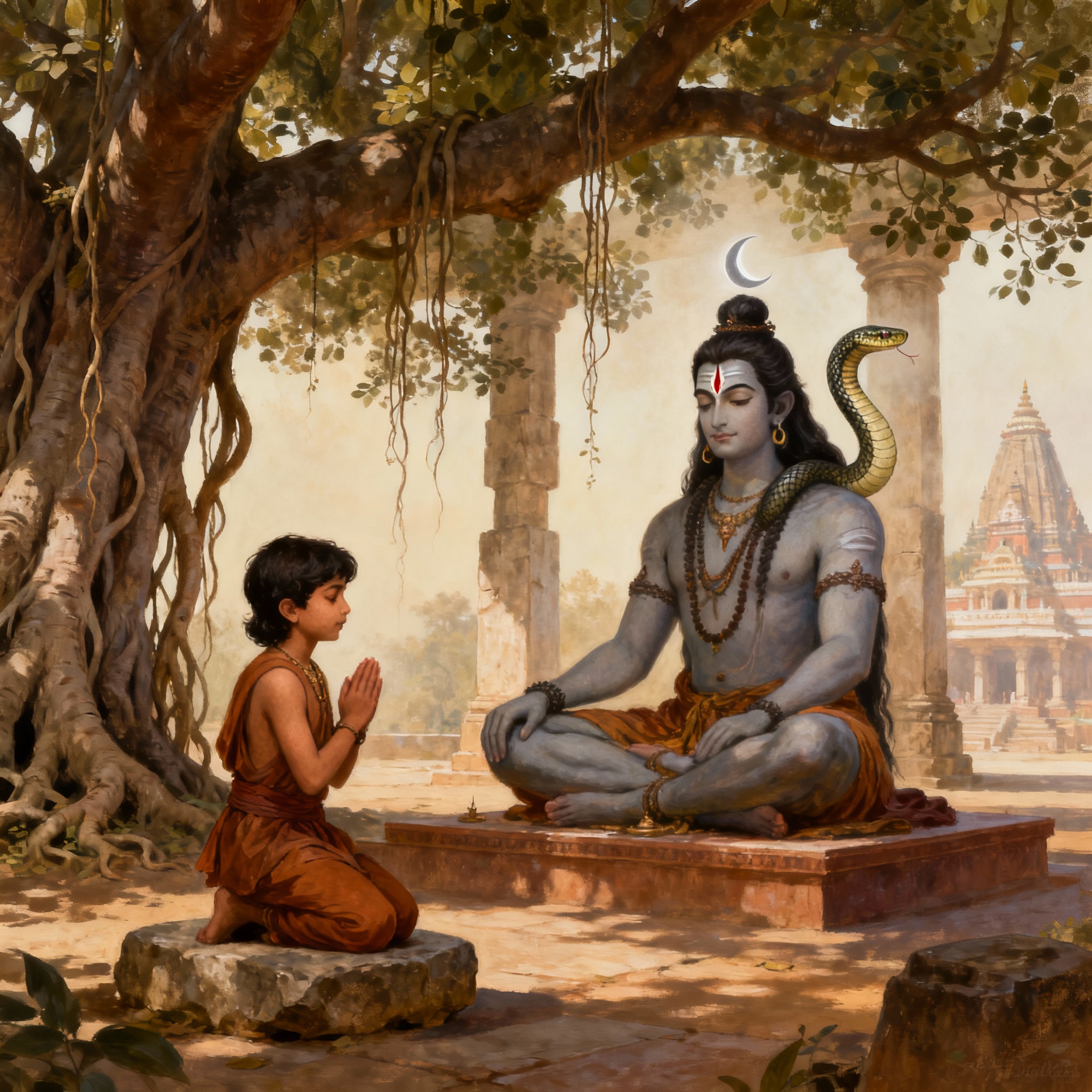
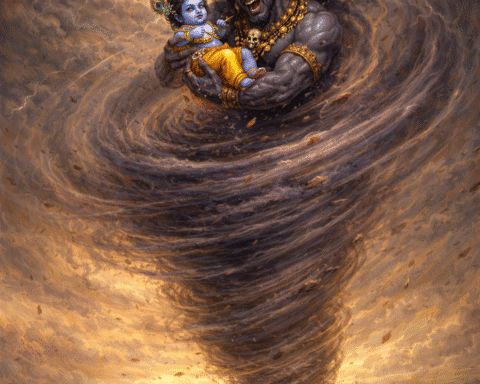
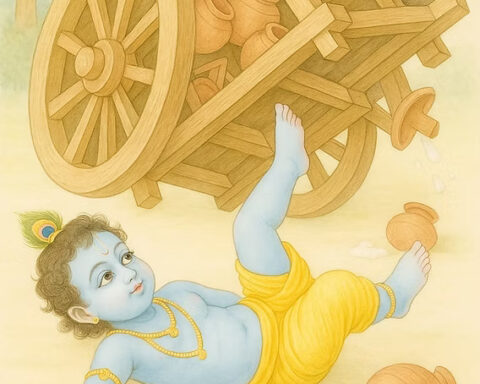
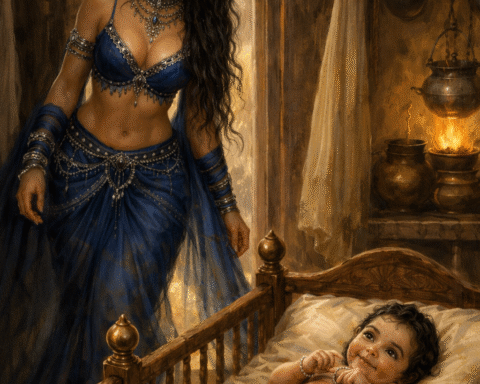
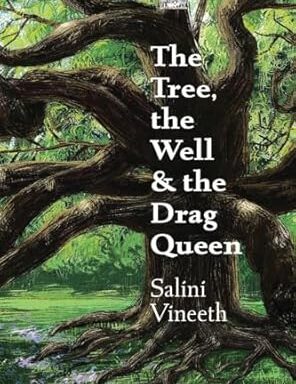
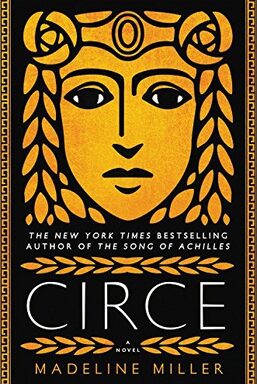
The most powerful line of the “Remember to be grateful for a day well spent when the sun sets and for a new day when the sun rises.” We actually forget to thank what we have and crave for what we dont. We should respect and thank God for every single day we are here on this earth as its no less than a blessing to witness the Sunrise and Sunset everyday. Powerful post
I have no words to describe how deeply the story of Sage Markandeya’s story of Immortality touched me. The way you broke down the concept of Temporality and how when intertwined with Immortality if can affect a person was so brilliant.Also valuable life lessons imparted.
Thank you for introducing me to the story of Sage Markandeya. It was powerful and full of life lessons.
It is daunting to think of being immortal. But still, each one of us should be grateful for every day that ends well and for the new dawn which gifts us a new day to better ourselves.
I really like the way you have brought out the near death experience, the blessings and the future. Everything in life is about the “willingness to learn new lessons, unlearn, and let go of old, valueless things like vanity, arrogance, and wickedness meant they were survivors.” We can only strive for the good in our live, like Sage Markandya.
What a wonderful piece, and what valuable lessons can be learned from it. The way it is written, I could almost feel the sage talking to me.
So refreshing how you retold Markandeya’s story with devotion, destiny and the triumph over death all come alive in your words. The way you highlighted faith’s power and the mysteries of time gave the legend a fresh and powerful shine.
So many life lessons to learn from Sage Markandeya’s story. His determination that made Shivji grant him immortality, his love that learned to let go, his belief that there’s a large pool of knowledge that one can keep absorbing from. I too have many questions like the Pandavas did.
I enjoyed how the story captures the timeless wisdom of Markandeya in a simple, readable way. It’s refreshing to find mythological tales told without heavy jargon…makes it accessible.
A wonderful story with lessons that are relevant even today. Thanks for shring Ratnaprabha.
Thank you for sharing new stories and perspectives that really change my view towards life.
Yes gratefulness for the day spent and looking forward to the new dawn. Profound though most difficult. Nice way of incorporating Sage Markandeya story to life’s learnings
Really enjoyed your take on Markandeya — you brought out his timeless wisdom and fearless spirit so compellingly!
Wow! This retelling of Markandeya’s tale is incredibly vivid and intense. The suspense, devotion, and cosmic drama kept me hooked — beautifully written and powerfully immersive!
I absolutely loved your retelling of this story..it was indeed good to know about Markandeyas life lessons.
I always learn something new each time I stop by your blog. What a beautiful life lesson this was.
I look forward to reading stories which you have made simple!! Thanks for sharing the story of Markandeya. There’s a peak near Nashik which is supposed to be associated with this sage.